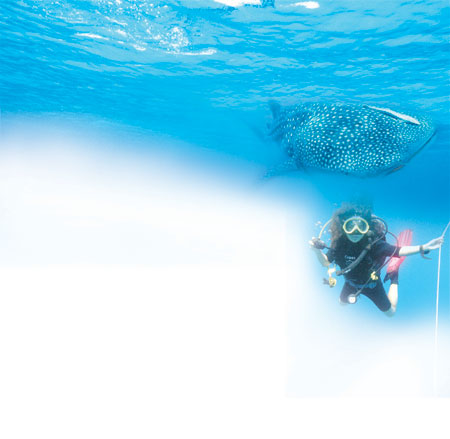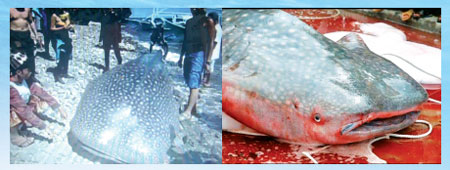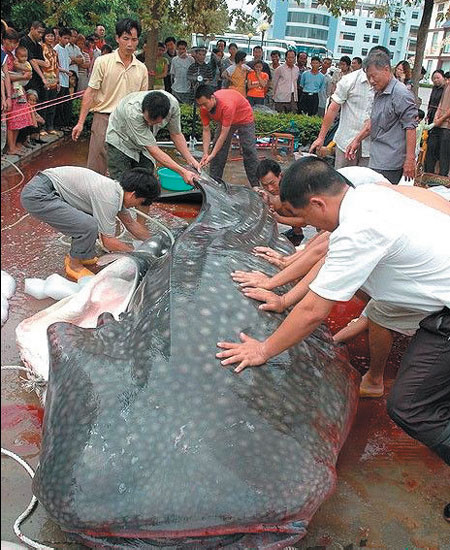Whale of a horror story
Updated: 2010-09-08 07:37
By Simon Parry(HK Edition)
|
|||||||
|
left: A scene from the video shot in the Philippines by Hong Kong holidaymakers showing a dying finned whale shark. Red Door News, Hong Kong Right: A dead whale shark Provided to China Daily |
|
Vicky Wong of the Hong Kong Shark Foundation has been a scuba diver since 1995. Red Door News, Hong Kong |
|
Newly-weds Constance Ching and Allen Tan at their shark's fin-free wedding banquet in Hong Kong in April Red Door News, Hong Kong |
|
Fishermen hack the fins of a captured shark. Provided to China Daily |

A three-minute video filming of the killing of a whale shark on a Philippine beach has started changing the palate and taste of Hong Kong. Simon Parry reports.
It is a pathetic, heart-rending sight. A bloodied whale shark lies motionless on a beach in the Philippines after suffering a painful death and a gaggle of fishermen and tourists stroll casually around its crumpled corpse.
The shark was captured by hunters who hacked its fins and then dumped it back in the sea to die. For the fishermen, who towed it to shore to give it a mercifully quicker death, it was all too common a sight in the waters of the Pacific Ocean where impoverished fishing communities value sharks for their fins.
This death was different, however.
A group of tourists from Hong Kong, who were witness to the horror scene and captured the act of cruelty on their video cameras, have lent a loud voice to the campaign against the culture of shark's fin consumption.
The three-minute footage has become an Internet fodder for activists, joined in by tens of thousands on YouTube and other sites. A hugely popular campaign has been launched on Facebook calling for cutting gift money for Hong Kong couples who serve shark's fin at their wedding banquets.
Some 19,000 people have signed up for the Chinese-language Facebook page titled Say No to Shark's Fin Soup.
For those Hong Kong tourists, who filmed the whale shark's painful death, as well as the countless Facebook campaigners, the message is the same: "I'll never eat shark's fin again."
Now, six months after the video started circulating, there are signs of a sea-change in people's opinion about the shark's fin trade in Hong Kong, which according to the World Wildlife Fund (WWF), accounts for half the global business. An estimated 73 million sharks are slaughtered a year.
The massive demand is driven by the tradition of serving shark's fin soup at wedding banquets and corporate functions as a display of ostentatious generosity that has until now been impervious to the cries of environmentalists.
As far as newly-wed Constance Ching was concerned, shark's fin soup was never even a consideration when it came to choosing the menu for her wedding banquet as she tied the knot with investment fund executive Allen Tan in June.
"We had a small dinner with relatives and family and we didn't serve it. There's another reception in November in Malaysia and we won't be serving it there either," said Constance, 34. "We didn't want to contribute to the killing of sharks, which are eco-friendly.
"There has definitely been a change in people's mind. It used to be a staple on any wedding banquet menu but not anymore. I attended the weddings of two friends in July and neither served shark's fin soup. Had that been on the menu, I'd have been surprised.
"If shark's fin is served now, I will certainly say something about it to the hosts. I'd ask the couple if they really know what harm people are doing to the eco-system by killing sharks."
According to the WWF, which launched a campaign three years ago in an attempt to persuade Hong Kong people to stop eating shark's fin, nearly 80 percent of them have eaten shark's fin, mostly at weddings and other celebrations.
At the time the campaign was launched, 114 shark species - more than a fifth of the total - figured in the International Union for Conservation of Nature's list of threatened species. These sharks were victims of a growing consumer demand and a thriving trade which was rising at 5 percent a year.
Hong Kong, the WWF says, is at the center of the global trade, handling at least half of the estimated 10,000 tons of shark's fin traded every year, either for domestic consumption or for the Chinese mainland where the demand is booming in line with its rapid prosperity.
The WWF hopes to see consumption of shark's fin in Hong Kong cut by 20 percent by 2011. It scored a public relations triumph in July when singer Miriam Yeung backed its campaign and pledged not to serve shark's fin soup at her own wedding banquet.
Vicky Wong, who has worked with the Hong Kong Shark Foundation (HKSF) for two years to try to persuade people to stop eating shark's fin, says the impact of the video cannot be underestimated.
"Everyone was talking about it - people were so shocked by it," she said.
"My uncle got extremely emotional after watching that, so much so that he delivered a speech at the family table and said, 'I swear I will never touch shark's fin again'. So the video has been really effective.
"Getting people so worked up about something is rare in Hong Kong. It was the power of the images - the cruelty of it all - that forced people to see the truth."
Nevertheless, for a seasoned campaigner against the shark's fin trade, the video came as a surprise. "It isn't the HKSF approach," Ms Wong said. "As a rule, shock tactics don't work. So we try to present facts and show people why the trade isn't sustainable. But for now, anything goes - just so long as we can get through to people."
Ms Wong says the change in attitude in the past two years is remarkable. "I got involved because I have been a scuba diver since 1995. Seeing sharks when I am diving is such a gift.
"I love sharks. I love seeing them, and I want to be able to carry on seeing them when I go diving. So it started as a selfish reason. I think they are beautiful and I just want to see them around."
Her presence added an important dimension to the campaign against shark's fin consumption that has often appeared to be missing - a local advocate. "I am a Chinese and you really need a Chinese face, otherwise it is too easy for people to say, 'Leave our culture alone. You don't understand anything'," Ms Wong said. "I don't want to give people that excuse."
At first, Ms Wong found the battle to persuade people not to eat shark's fin an uphill one. "Even my own family said at the beginning there was no issue with sharks and they would rather give money to a children's charity or a charity that helps other animals.
"My mother said, 'Oh let me eat it - I'm old.' A lot of people couldn't see why I was upset when they said they were going to have shark's fin. They couldn't see the relevance.
"Some people just think I'm mad and say, 'What are you talking about?'. They'll go to restaurants in Bangkok specially to have shark's fin and if you ask them why they say: 'Because it's cheaper here.' They still associate it with money and think that if you can afford it, it's a great thing."
Attitudes have since changed significantly, Ms Wong believes. "We feel we have hit the tipping point now," she said. "I've actually managed to convert quite a few of my friends. They can see the seriousness of the issue."
The HKSF has focused its efforts on educating younger people. Ms Wong, a schoolteacher at Sha Tin, has taken her campaign to classrooms including English Schools Foundation schools around Hong Kong where she says feels as if she is preaching to the converted.
"Children are very receptive - maybe because they haven't been exposed to the movie Jaws like the older generation was," Ms Wong said. "Children do beautiful drawings of sharks and they are all very receptive to the issue. It is adults who are dismissive."
The HKSF is now preparing education programs for university undergraduates at the City University and the University of Hong Kong. "We want to focus on university students because they will be the ones to get married in the next few years," Ms Wong said.
"I want to change the cultural perception about shark's fin. We want some really fashionable people or a pop icon to speak out."
The impact of changing attitudes in recent months and years is difficult to gauge. Import and sales figures are jealously guarded and while some industry insiders admit there has been a fall in demand, they will not go as far as quantifying the decline.
In its campaign of gentle persuasion, the WWF has signed up 18 hotels and restaurants, including the Excelsior Hotel, the JW Marriott, the Hong Kong Gold Coast Hotel and Hong Kong Jockey Club venues to offer shark's fin free banquet menus.
Andy Cornish, director of conservation for the WWF Hong Kong, described the move as "a significant step forward to reduce Hong Kong's impact on many shark populations worldwide". He said: "We're heard of countless battles by individuals who've struggled to find shark-free banquets in recent years."
Impressive as the list of hotels and restaurants is, however, the fact remains that the impact has still been limited. No single top restaurant or hotel - with the exception of Disneyland which was forced by a public outcry to withdraw shark's fin from its hotel menus when it opened in 2005 - has yet gone so far as to say they will no longer serve shark's fin.
Ms Wong believes breaking the relationship between hotels and restaurants and the shark's fin trade will take time. "There is some special arrangement between the shark trade and the restaurants," she said.
"I am sure they pay a lot of money to the chef and the restaurant to include shark's fin. It is very much part of the system. And if you don't question it, it will just be there. They will sneak it in."
For Ms Wong, the greatest personal triumph came when her mother and father celebrated their 40th wedding anniversary with a banquet last year and served up broth without shark's fin. "I was very proud of them," she said. "I thought they were going to serve shark's fin soup and I looked around, but it was just the broth and not the fin - and it tasted exactly the same.
"I think they did it for my benefit. I thanked my mother and she was very happy that I was proud of them. But shark's fin has no taste anyway. It is like vermicelli. It's the broth that people like. So there really is no excuse for such cruelty to continue."
(HK Edition 09/08/2010 page4)



